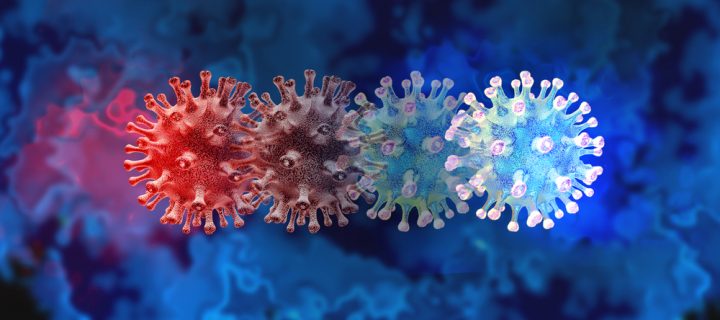The variants are more contagious, sometimes deadlier, and we are racing to catch up.
There are currently thousands of novel coronavirus variants, if not more, circling the globe. Viruses mutate all the time and variants are to be expected. Viruses mutate in order to better adapt to their environment. This is in an effort to stay alive and strong for longer periods of time on our planet.
Most mutations in viruses don’t really have a major effect on us. Unfortunately some do. This is the case with a few COVID-19 variants, which is a cause for concern. It’s now a race against time. Countries are administering coronavirus vaccines to as many people as possible, as quickly as possible, but the seemingly inevitable looms over the horizon. Will we protect ourselves before the virus mutates into something so different, the vaccines won’t work?
The UK Variant (B.1.1.7)
The biggest problem variants that scientists are now aware of include the UK, South African, and Brazilian variants. According to the Centers for Disease Control and Prevention (CDC), the UK variant, also called B.1.1.7, was first identified in the fall of 2020. It is thought to have originated in Kent County, which is located in Southeastern England. No one knows for sure, but there is speculation that it may have sprung up in someone with a suppressed immune system who was being treated for the virus with convalescent plasma. This could have given the virus a long time to mutate several times in their body while evading their immune system. Essentially, it could have given the virus a chance to perfect its design for its own survival against the human immune system.
Related: Going Back to School and the Coronavirus: Dealing With Mental Health
The results are a bit eerie. Research done by Public Health England indicates the UK variant is between 30% and 50% more contagious than the original novel coronavirus, but some push that up to 70%. This variant spreads more easily because its spike protein attaches to human cells more effectively. Some reports have described it as ‘having more effective velcro’. And it gets worse. A study cited by Forbes.com says people who contract this variant are 55% more likely to die from it.
South African Variant (B.1.351 or 501.V2)
Thankfully, the South African variant isn’t as bad as that from the UK. According to a report on BBC.com, it doesn’t really cause people to fall sicker than does the original virus causing COVID-19. As with this one, it also is deadliest in elderly people, and those who have striking underlying health conditions. This being said, the South African variant does seem to spread more easily than the original, which is cause for some concern.
The Brazilian Variant (P.1)
At the time of this writing, Brazil is now in the throws of a battle against the P.1 variant. According to news reports, upwards of 3,000 people are currently dying in Brazil from the variant each day. Brazil is now home to less than 3% of the world’s population but sadly about a third of all coronavirus deaths. This variant is bad news. It is about 2.2 times more contagious than the original, and can reinfect people. In fact, it is just over 60% more able to reinfect you than the original. So, the infections just keep circling around, after a few months. This variant is now dominating the scene in Brazil, and causing younger people to die at higher rates.
Related: Gum Disease and the Coronavirus
What’s Being Done
Unfortunately, we will continue to experience new variants as the virus causing COVID-19 continues to mutate across the globe as time passes. The good news is, the current coronavirus vaccines still offer some protection against the variants. The Pfizer, Moderna, Johnson & Johnson, and Novax vaccines are less effective, but they still work to some degree. (AstraZeneca’s vaccine was found to be only 10% effective in preventing mild to moderate infections against the South African variant in people with a median age of 30 years, which is unnerving).
Pharmaceutical companies are now working on updating their vaccines to catch up with the variants. Moderna and Pfizer are testing a third booster shot to target the South African variant. Moderna’s CEO has gone so far as to state the company is committed to making as many changes and updates to its vaccine as is needed until the pandemic is over, or at least it’s under control.
In February 2021, Eric Levitz writing for the Intelligencer expressed that we might not be anywhere close to achieving herd immunity, but that living a normal life again was coming into sight, even with the variants among us. Does he still feel the same way?
It is difficult to say. We don’t know that our vaccines will beat out the coronavirus and stop the pandemic in its tracks, as the virus is so unpredictable. What is good to remember is that all pandemics have come to an end in one way or another, throughout history. So, the coronavirus pandemic can’t go on forever. Science will continue to put its strongest foot forward, and hopefully case counts will continue to drop.
For more on the history of viruses, and why some survive to bother us for centuries while others die out, click here.
photo credits: Lightspring/Shutterstock.com












